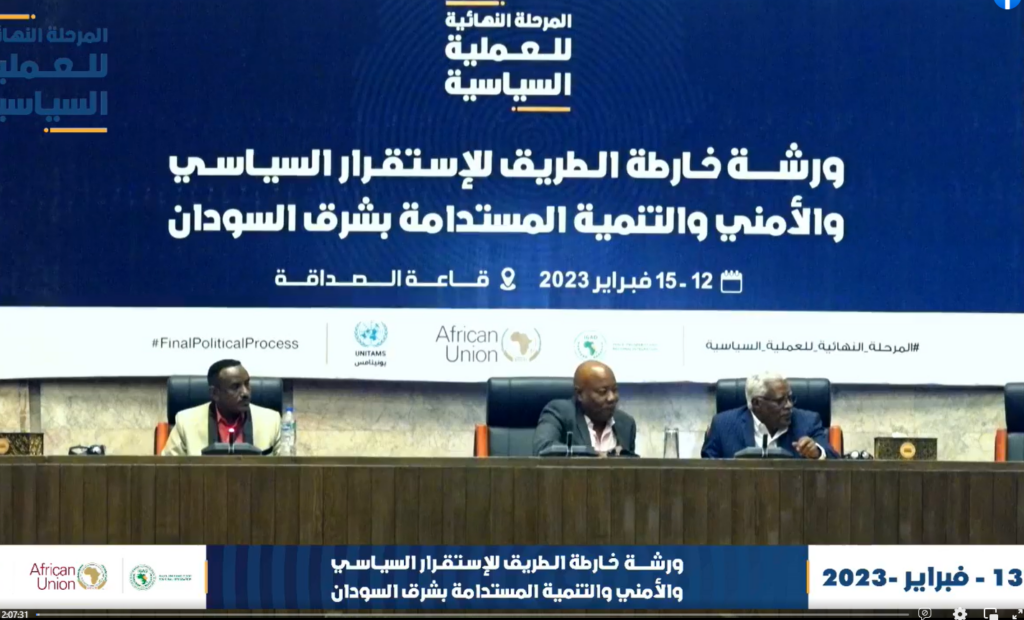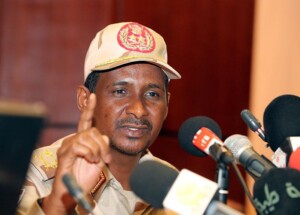Eastern Sudan Conference continues amidst criticism of poor organisation

An Eastern Sudan Conference workshop session in the Friendship Hall in Khartoum yesterday (SUNA)
KHARTOUM – February 14, 2023
The Eastern Sudan Conference continued for the second day yesterday in the Friendship Hall in Khartoum with sessions on several important topics, including women’s issues and economic and social development. The conference was criticised for being poorly organised.
The conference participants discussed women’s issues, economic and social development, decentralisation, and the role of the native administration in promoting community peace as experts presented papers to the audience of the workshop sessions.
Hamrour Hussein, a leading member of the People’s Front for Liberation and Justice and member of the High Committee for the Preparation of the Eastern Sudan Conference, told Radio Dabanga that the papers were discussed extensively and that the workshop participants came up with important recommendations.
The conference, officially called ‘the roadmap conference for political stability, security, and sustainable development in eastern Sudan’, has been organised by the AU-IGAD-UNITAMS Trilateral Mechanism in cooperation with the mainstream Forces for Freedom and Change-Central Council (FFC-CC), taking place from February 12 to 15, and is thus set to conclude tomorrow.
He explained that hundreds of people from the three eastern Sudanese states, Red Sea state, Kassala, and El Gedaref, representing various social, cultural, and political groups, are taking part in the conference.
The workshop will produce important results to address the issues of eastern Sudan and promote societal peace, Hussein added.
The Eastern Sudan Conference is the latest step in discussions over five so-called thorny issues in the country. The last conference on the Juba Peace Agreement (JPA) explored drivers of conflict and ways to better implement and revitalise the agreement. The first conference, on the empowerment removal process, concluded in Khartoum on January 12.
Women issues
Renowned El Ahfad University Professor Belghis Badri presented a paper on women’s issues in eastern Sudan yesterday, in which she proposed the establishment of a number of funds to support women in the marginalised region.
The proposed funds include a Girls’ Education Fund, to be financed by Zakat (Muslim alms) chambers and supported by UN agencies, a Women’s Health Support Fund, funded by social responsibility funds of companies managed by relevant UN agencies, and an Economic Support Fund, financed by companies of Sudanese women residing abroad, “especially in countries overlooking the Red Sea”.
She further recommended training young eastern Sudanese women in the field of politics “to empower them politically” and to train young women from the region in media and tourism.
Criticism
El Gedaref activist Jaafar Khidir, who was detained several times during the regime of Omar Al Bashir, criticised the poor preparation and costs of the conference, organised by the Trilateral Mechanism in cooperation with the FFC-CC.
He told Radio Dabanga that the conference will contribute little to solving the region’s problems. “We hold them [the organisers] responsible for any problems caused by the conference.”
A large number of important regional actors did not receive an invitation, “even those affiliated with FFC-CC, due to the poor organisation,” Khidir explained.
He also noted the participation of affiliates of the disbanded National Congress Party of former dictator Omar Al Bashir and commanders of the infamous Rapid Support Forces in El Gedaref.
“The invitees were not notified of the conference’s agenda and its relationship to the Framework Agreement. The paper presenters were notified two days in advance to prepare their presentations,” Khidir complained.
“All in all, it is likely that the sole purpose of the conference is to have it happen in order to reach a final agreement with the military.”
He stressed the necessity of holding workshops in all localities in the three eastern Sudanese states, and of collecting their recommendations to be studied and agreed on at a more appropriate time.
Take revolutionary actors seriously
The Regional Centre for Civil Society Training and Development praised the participation of many stakeholders in the conferences on contentious issues in the country, but stressed the need “to ensure the participation of a wide spectrum of those who are committed to the goals of the revolution, and to take them seriously as well”.
The centre said in a statement yesterday that the political process needs to be transparent and inclusive with broad participation in order to agree on a new transitional constitutional document.











 and then
and then